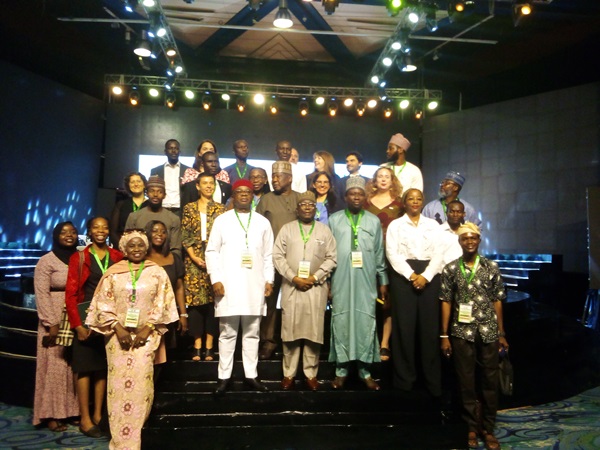
The Federal Government of Nigeria, in partnership with the Nationally Determined Contribution (NDC) Partnership and with support from the United Kingdom government, has launched the NDC Implementation Framework (IF) for the period 2023-2030.
This initiative aims to align and harmonise key climate and development policies, targets, strategies and plans to effectively address the climate change crisis.
The director-general of the National Council on Climate Change (NCCC), Dr. Salisu Dahiru made this announcement during the launch of the NDCs Implementation Framework organised by NCCC in Abuja.
The NDCs Implementation Framework emphasizes practical implementation rather than just setting ambitious goals for stronger climate action. Dahiru revealed that the comprehensive NDC includes an unconditional 20 per cent reduction in emissions by 2030 compared to the business-as-usual (BAU) projection. With international support, the ambition has been raised to 47 per cent compared to BAU, surpassing the previous target of 45 per cent set in the 2015 NDC. This increase covers various sectors such as agriculture, energy, forestry, land use, transport, waste, water, industries and nature-based solutions.
Stakeholders across these sectors need to familiarise themselves with this implementation framework, which requires activities such as awareness creation, mobilisation, socialisation, communication, education, and proper monitoring of the outcomes.
The country has demonstrated its commitment to climate action with bold steps, as illustrated at COP26 in Glasgow when the President announced a net zero commitment by 2060. These net-zero targets align with various national processes, including the NDC Implementation Framework, LT-LEDS development/submission, Nigeria’s Deep Decarbonisation Project, the Energy Transition Plan, and the Nigeria Climate Change Response Programme.
The framework includes a national tool designed to ensure coordination, transparency, and resource mobilisation, playing a crucial role in tracking and reporting the progress outlined in the updated NDCs. It facilitates collective impact in climate action efforts.
Through 19 outcomes, 151 outputs, and 301 key performance indicators (KPIs), the framework aims to align with national and sectoral climate-related action plans, development goals, planning and budgeting processes. It serves as a central platform for stakeholders to access Nigeria’s climate action priorities, support needs, ongoing progress and additional support alignment and catalysis from partners.
The estimated cost of implementing the NDC IF from 2023 to 2030 amounts to approximately US$189 billion, with the water, energy and AFOLU sectors requiring an estimated US$173 billion. Climate change continues to pose a significant challenge, impeding Nigeria’s progress towards sustainable development.
Incorporating gender and youth perspectives in workshops has significantly enhanced the outcomes, outputs and KPIs of the NDC IF, as indicated by the National Education Research and Development Council.
Secretary to the Government of the Federation, Sen. George Akume emphasised the importance of NDC as a reflection of the collective vision, shared values and unwavering commitment to the Paris Agreement and sustainable future generations. Akume highlighted the ecological roots of the insecurities in Nigeria, underscoring the need for a coordinated national approach to the framework for climate action priorities.
Climate change poses threats that transcend borders, affecting not only the environment but also the socio-economic fabric worldwide. The NDC IF serves as a transformative roadmap linking strategies, policies, and measures to guide efforts in reducing greenhouse gas emissions, enhancing resilience and fostering sustainable development.
Building on inclusivity, innovation, and integrity, the framework engages all sectors of society in contributing to climate goals effectively. The Minister of Environment, Malam Balarabe Lawal stressed the urgency of accelerating climate change mitigation and adaptation efforts to address the evolving challenges presented by a warmer future.
The NDC IF offers a robust and comprehensive framework for implementing climate goals across various sectors, ensuring coordinated, effective and inclusive actions. It calls for collaboration among government agencies, private sector partners, civil society organisations, and all citizens passionate about securing a sustainable future.
Collaboration, innovation, and dedicated efforts are essential for realising a low-carbon future and addressing national development challenges through environmental sustainability and green growth.
Country director on engagement for NDC, Mariana Panucio affirmed the commitment to driving Nigeria’s climate targets by 2030 and expressed readiness to collaborate with partners. The dynamic results-based approach adopted by the NDC IF facilitates effective coordination of climate actions and is open for investment.
Sponsor of the Climate Change Act in Nigeria, Sam Onuigbo urged participants to translate the NDC IF into actionable plans. He emphasised the achievability of the 2023 targets due to increased awareness and the responsibilities assigned to various agencies in tackling climate change issues.

